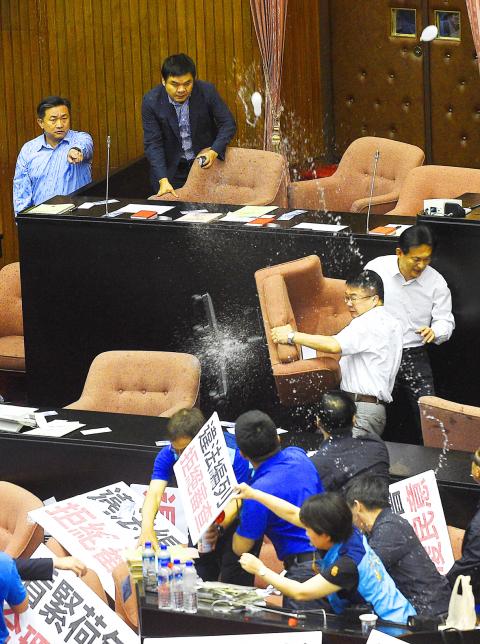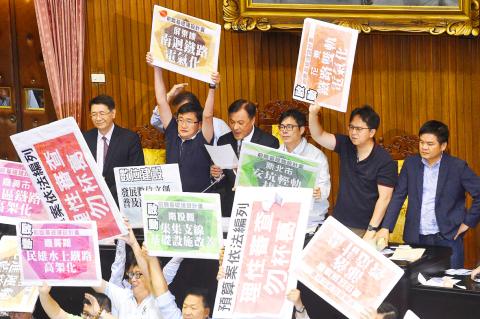After a presentation on the Forward-looking Infrastructure Development Program by Premier Lin Chuan (林全) was yesterday once again blocked by Chinese Nationalist Party (KMT) legislators, Legislative Speaker Su Jia-chyuan (蘇嘉全) bypassed a legislative question-and-answer session to send the Executive Yuan’s budget proposals to a committee review.
As soon as Su announced the start of the plenary session, KMT legislators, who had stayed in the chamber overnight, started shouting slogans, sounding air horns, blowing whistles, and throwing water balloons and fake banknotes to prevent Lin from reaching the podium.
KMT caucus secretary-general Lin Wei-chou (林為洲) threw a water balloon at DPP Legislator Wu Ping-jui (吳秉叡). Wu countered by tossing a chair toward Lin Wei-chou, which missed.

Photo: Chen Chih-chu, Taipei Times
DPP Legislator Chuang Ruei-hsiung (莊瑞雄) threw water from a vacuum flask at KMT lawmakers, who hit back with water balloons. Chuang then lifted up a chair and threatened to hurl it toward his KMT colleagues.
DPP caucus secretary-general Lee Chun-yi (李俊俋) scuffled with KMT Legislator Alex Fei (費鴻泰), while DPP Legislator Su Chen-ching (蘇震清) and KMT Legislator Hsu Chih-jung (徐志榮) also came to blows.
No more than five minutes into the session, the situation was completely out of control, forcing Su to end the meeting after advising Lin to leave.

Photo: Chen Chih-chu, Taipei Times
Su later sought to resolve the deadlock by calling a cross-caucus negotiation, which the KMT caucus refused to attend.
During the negotiation, People First Party caucus whip Lee Hung-chun (李鴻鈞) said that the Special Act on the Forward-looking Infrastructure Development Program (前瞻基礎建設特別條例), which was passed last week, stipulates that the budget cap for the first stage of the program is set at NT$420 billion (US$13.8 billion) over four years, but the budget proposal by the Executive Yuan was for only NT$108.9 billion over two years.
The Cabinet should at least outline its budget plans over four years before legislators can conduct a more detailed review of the funds needed for the early stages of the program’s 65 sub-projects, Lee said.

Photo: Liu Hsin-de, Taipei Times
New Power Party (NPP) caucus whip Hsu Yung-ming (徐永明) said the NPP hopes that Lin can brief legislators on the program before the budget proposal proceeds to committee review, so the proceedings would conform to due legislative procedure.
Whether the Cabinet has breached the act in its way of budgeting the program is “subject to different interpretations,” Hsu said, suggesting that there is ambiguity in the act.
He said that Lin’s presentation and the question-and-answer session should be postponed until Monday.
Su agreed, adding that he would consult with the KMT caucus for its opinion.
Speaking by telephone, Lin Wei-chou said that the KMT would not accept the terms proposed by Su during the negotiation.
In an unexpected move, Su re-emerged in the chamber shortly after the negotiations and announced that a motion by the DPP to send the budget proposal to committee review on Monday was to be voted on, despite KMT legislators’ strong protests.
The motion was passed after gaining the support of the DPP caucus, which has a legislative majority.
The KMT caucus in the afternoon held a news conference at the legislature, saying it would report Su to the Discipline Committee and file a lawsuit with an administrative court to determine the legitimacy of the motion.
Su’s bypassing of a question-and-answer session breached the Act Governing the Exercise of Legislative Power (立法院職權行使法) and deprived legislators of their right to question officials, Lin Wei-chou said, demanding that Su step down.
Budget proposals put forward by the former KMT administration had also proceeded to committee review without former premier Jiang Yi-huah (江宜樺) briefing the legislature, KMT Legislator Lai Shyh-bao (賴士葆) quoted Su as saying.

NATIONAL SECURITY THREAT: An official said that Guan Guan’s comments had gone beyond the threshold of free speech, as she advocated for the destruction of the ROC China-born media influencer Guan Guan’s (關關) residency permit has been revoked for repeatedly posting pro-China content that threatens national security, the National Immigration Agency said yesterday. Guan Guan has said many controversial things in her videos posted to Douyin (抖音), including “the red flag will soon be painted all over Taiwan” and “Taiwan is an inseparable part of China,” while expressing hope for expedited “reunification.” The agency received multiple reports alleging that Guan Guan had advocated for armed reunification last year. After investigating, the agency last month issued a notice requiring her to appear and account for her actions. Guan Guan appeared as required,

A strong cold air mass is expected to arrive tonight, bringing a change in weather and a drop in temperature, the Central Weather Administration (CWA) said. The coldest time would be early on Thursday morning, with temperatures in some areas dipping as low as 8°C, it said. Daytime highs yesterday were 22°C to 24°C in northern and eastern Taiwan, and about 25°C to 28°C in the central and southern regions, it said. However, nighttime lows would dip to about 15°C to 16°C in central and northern Taiwan as well as the northeast, and 17°C to 19°C elsewhere, it said. Tropical Storm Nokaen, currently

PAPERS, PLEASE: The gang exploited the high value of the passports, selling them at inflated prices to Chinese buyers, who would treat them as ‘invisibility cloaks’ The Yilan District Court has handed four members of a syndicate prison terms ranging from one year and two months to two years and two months for their involvement in a scheme to purchase Taiwanese passports and resell them abroad at a massive markup. A Chinese human smuggling syndicate purchased Taiwanese passports through local criminal networks, exploiting the passports’ visa-free travel privileges to turn a profit of more than 20 times the original price, the court said. Such criminal organizations enable people to impersonate Taiwanese when entering and exiting Taiwan and other countries, undermining social order and the credibility of the nation’s

‘SALAMI-SLICING’: Beijing’s ‘gray zone’ tactics around the Pratas Islands have been slowly intensifying, with the PLA testing Taiwan’s responses and limits, an expert said The Ministry of National Defense yesterday condemned an intrusion by a Chinese drone into the airspace of the Pratas Islands (Dongsha Islands, 東沙群島) as a serious disruption of regional peace. The ministry said it detected the Chinese surveillance and reconnaissance drone entering the southwestern parts of Taiwan’s air defense identification zone early yesterday, and it approached the Pratas Islands at 5:41am. The ministry said it immediately notified the garrison stationed in the area to enhance aerial surveillance and alert levels, and the drone was detected in the islands’ territorial airspace at 5:44am, maintaining an altitude outside the effective range of air-defense weaponry. Following